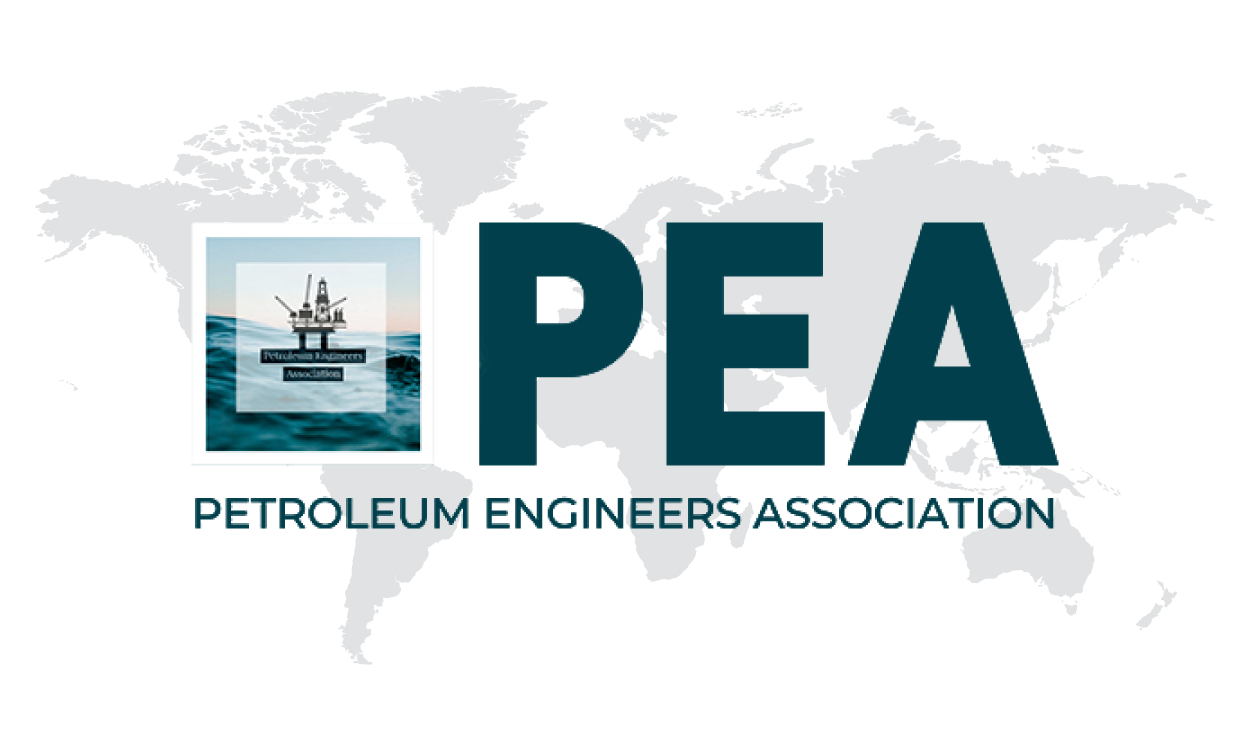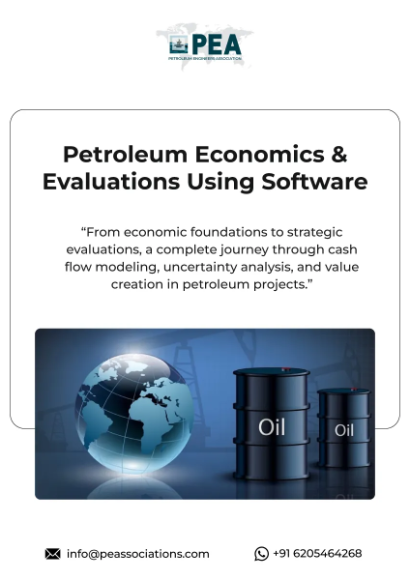Petroleum Economics & Evaluations
| Code | Date | Time | Duration | Location | Currency | Team of 10 Per Person | Team of 7 Per Person | Early Bird Fee Per Person | Normal Fee Per Person |
|---|---|---|---|---|---|---|---|---|---|
| PEE/PEA/25 | 24 - 30 Nov 2025 | 10:30 PM Indian Time |
3 Hours Per Day
|
Zoom Online
|
USD
|
1650
|
1750
|
2000
|
2500
|
The Classes Will be Online Via Zoom for a Week with 3 hours / day.
Boost your team's skills and your budget! Enjoy group discounts for collaborative learning. Send an inquiry to info@peassociations.com.
Petroleum Economics & Evaluations
This course provides a comprehensive understanding of petroleum economics, project evaluation methods, and decision-making tools used in the oil and gas industry. Participants will gain practical skills in economic modeling, cash flow analysis, and risk assessment to support sound investment decisions.
Description
The oil and gas industry is defined by high investment intensity and complex financial dynamics, making robust economic evaluation essential for project success. From capital budgeting to profitability forecasting, this course addresses the unique challenges of risk, long project lead times, and fluctuating revenues. Participants will learn how technical and economic disciplines converge, and how to make informed decisions in environments of uncertainty and volatility.
Understand the fundamentals and methodologies of petroleum economics
Master industry-standard evaluation tools including NPV, ROR, PI, POT, and decision tree analysis
Apply economic analysis to justify exploration, development, and acquisition projects
Analyze risk, perform sensitivity studies, and model cash flows for capital projects
Interpret project financials for investment decision making
Assess oil and gas pricing, forecasting, and reserves estimation
Integrate economic evaluations into corporate planning, budgeting, and asset management
Interactive sessions and practical exercises
Case studies based on real oil and gas field scenarios
Hands-on software demonstrations and workflow simulations
Facilitated group discussions to develop actionable insights and foster multidisciplinary teamwork
Enhance the organization’s capability to effectively evaluate projects and allocate capital
Improve accuracy of financial forecasts, budgeting, and reporting
Strengthen business case development for exploration, production, and asset transactions
Augment decision-making processes through applied risk analysis and economic modeling
Foster a culture of cross-disciplinary collaboration and informed investment planning.
Build advanced expertise in petroleum economic evaluation and financial modeling
Gain practical skills to participate confidently in multi-discipline project teams
Expand career opportunities in reservoir engineering, project management, and financial planning
Develop the ability to interpret and communicate complex financial results to key stakeholders
Become a valued contributor to organizational growth through enhanced analytical skills.
Petroleum Reservoir Engineers
Petroleum Economists
Finance and Auditing Professionals
Planning Managers
Project Managers
Professionals involved in project investment, asset management, or financial decision making in the oil & gas industry.
Day 1:
• The Value Chain in the E&P Industry
• Importance of Petroleum Economics
• Petroleum Economics Fundamentals
• Methods of Evaluation
• Project Life Cycle and Who Is Involved
• Common Types of Oil and Gas Upstream Projects
• Economic Indicators Definition
• Project Evaluation using Economics Decision Yardsticks
• Cash Flow Analysis
• Fiscal Regimes
• Economic Analysis Workflow
Day 2:
• Statistical Review of World Energy
• Classification of Energy Sources
• Oil and Gas Recourses and Reserves
• Unconventional Oil and Gas Resources
• Reserves vs. Resources
• Reserve Categories and Classifications
• SPE Petroleum Resources Management System (PRMS)
• Project Maturity Sub-Classes: Play, Lead, and Prospect
• Economically Producible vs. Commercially Recoverable Reserves
• Reserves and Constraints for Project Financing
• Reserve Calculations and Estimation Techniques: Volumetric, Decline Curve Analysis (DCA), Material Balance Analysis, Rate Transient Analysis
• Production Volumes and Forecasting
Day 3:
• Uncertainty and Risk Analysis in Petroleum Exploration and Production
• Oil Pricing Criteria and Factors Affecting Oil Prices
• Hubbert Model for Oil Peak Forecasting
• Price Forecasting
• The Role of Project Economics
• Calculating Cash Flow
• Economic Indicators
• Net Present Value
• Capital Investments
• Operating Costs
• Sunk Costs
• Royalties and Taxes
• Working Interests
• Discounted Cash Flow (DCF) Analysis
• Example Cases & Practice
Day 4:
• Time Value of Money
• Economic Analysis Output
• Net Present Value (NPV)
• Rate of Return (ROR) or Internal Rate of Return (IRR)
• Graphical Solution for ROR
• Payout Period Calculation
• Profit / Investment Ratio
• Discounted Profit-to-Investment Ratio
• Hurdle Rate
• Example Cases & Practice
Day 5:
• Weighted Average Cost of Capital (WACC)
• Discounting Methods
• Monetary Values – Inflation and Escalation
• Fiscal Regimes
• Types and Elements of Fiscal Regimes
• Concessionary Regime Flowchart
• Structure of Royalty / Tax Regime
• Production Sharing Regime Flowchart
• Contractor/ Government Take
• Example Cases & Practice
Day 6:
• Project Investment Analysis
• Economic Calculations Workflow
• Economic Reporting
• Point Forward vs. Full Cycle Economics
• Decision & Risk Analysis
• Tornado Diagrams & Decision Trees
• Example Cases & Practice
Day 7:
• Multiple Project Investment Analysis
• Project Ranking and Investment Priority
• The Capital Budgeting and Project Selection Process
• Production Scenarios
• Risk & Sensitivity
• Tornado & Spider Diagrams
• Probability Distribution
• Monte Carlo Simulation
• Example Cases & Practice
On successful completion of this training course, PEA Certificate will be awarded to the delegates.
Hesham Mokhtar is a Reservoir Engineering Team Leader at General Petroleum Company (GPC) in Egypt. He has extensive experience in reservoir management, characterization, and production optimization. He is skilled in using various software for reservoir simulation and analysis. He has also delivered training courses on waterflooding, PVT analysis, reservoir simulation, and more.
- 14+ years of Petroleum Engineering expertise delivering technical solutions to E&P portfolios.
- Expert in reservoir evaluations, log interpretations, and hydrocarbon estimations using tools like Techlog, Volumetric, DCA, MBE, OFM, and KAPPA
- Analyzes production data, material balance, RFT/MDT data, and pressure transients for reservoir performance and optimization.
Frequently Asked Questions
All course bookings made through PEA are strictly non-refundable. By registering for a course, you acknowledge and accept that all fees are payable in full and are not subject to refund under any circumstances, including changes in personal or professional commitments or partial attendance.
PEA reserves the right to make reasonable adjustments to course content, trainers, or schedules where necessary, without entitling delegates to a refund. Comprehensive details of each course — including objectives, target audience, and content — are clearly outlined before enrolment, and it is the responsibility of the delegate to ensure the course's suitability prior to booking.
For any inquiries related to cancellations or bookings, please contact our support team, who will be happy to assist you.



